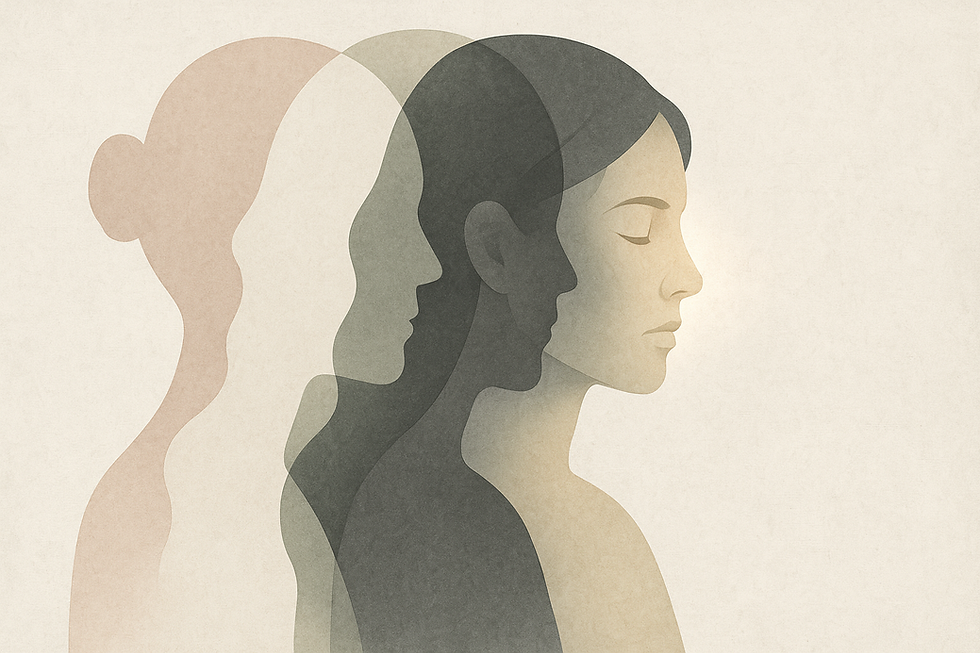Survivor Voices: Brianna's Story
- Trina Kay

- Oct 19, 2025
- 4 min read
Brianna is a single mom of two—her daughter is seventeen, her son eleven. She left her abuser, her ex-husband, soon after their son was born. Their relationship began when she was just sixteen and he was twenty-three.
“Sixteen and twenty-three is a huge difference when you’re in high school. But I thought I was just so mature… turns out he was just a bum and nobody his age wanted him.”
Her parents disapproved from the start.“My dad hated him. From the gate. My mom had already said he was too old for me. But I was down at his house every day. They could have stopped it. At least that’s my opinion. I’ve made peace with that— I was literally with him every single day. He wasn’t allowed to go to my prom cause he was too old so I went with a girl. But, like he was an adult. Like he drove me to school.”
Brianna says she normalized the behavior early on. “I thought it was normal to be treated like crap by a guy.” He was involved in things that brought in fast cash, and she thought it was exciting. “I was 16 with 10 grand under my bed. But, he would buy me clothes and shoes and it didn’t occur to me that he had all of this money because he was in trouble.”
At first, she didn’t call it abuse. “He never put his hands on me until I was pregnant with my son.” But before that, there were holes in walls, a shattered bathroom cabinet, a broken shower tile. She remembers one moment clearly—she had charged at him, and he body slammed her onto the couch. “He immediately apologized, but I wasn’t hurt because it was a couch, so I didn’t think of it like that. Looking back, I think—good men don’t do these things.”
“It was always explosive anger. When I was in college I went to lunch with a guy. And when I came home he took a knife and held it to himself and said that he’d die and kill himself right in front of me if I ever talked to that kid again. I was 18.”
Nobody ever talks about how threats of self-harm are abuse too.
Brianna grew up in a family where emotional abuse was common. “Everyone in my family was emotionally abusive towards one another,” she says. “Aunts and uncles. My mom and dad fought constantly. Him being angry all the time and the chaos—it just felt normal.”
She finally left her husband when her son was three months old.She didn’t make much money—“I didn’t make a lot of money. He made all the money— I made like $13 an hour at the county.” But when she found out her second pregnancy was a boy, something shifted. “I couldn’t raise a boy with this man. I couldn’t allow it to continue.”
At six months pregnant, she was already planning and praying for a way out. At eight months, he tackled her while drunk after she said she was going to her parents’ house for a while. When she went into labor, she had to drive herself to the hospital. “I called the bartender where I knew he probably was to tell him.” He didn’t pick her up when she and the baby were released. Her dad had to come.
One Sunday in church, while praying for guidance, she heard it clearly: “Just go.”
She came home, told him it was over, and gave him six months to get sober. He didn’t. Instead, the abuse continued. He threatened to kill her and take the kids. When her son was ten months old, he grabbed the crying baby by the foot and hit him against the wall.
It took her three tries to get a PFA. “Snitches get stitches” was the text that finally convinced a judge to grant it. She was given a three-year protection order, and she hasn’t heard from him in eight years.
When asked what finally made her leave, she doesn’t hesitate: “Being pregnant with my son. My son saved us.”
Her best friend in high school had seen the red flags early. “She stopped hanging out with me because of how he treated me.”
Before ending our conversation, I asked Brianna what she wishes more people understood about abuse and survivors.
“That we didn’t pick this. It takes time to realize that you’re in a bad situation. You don’t just pick these things. And if you’ve never had an example of good then you accept what’s comfortable. Until you learn better. And then when you learn better you have to do better. It doesn’t start with being that awful.”
She adds, “In my most recent relationship it started with not being allowed to wear leggings.”
Brianna reminds us that it starts small. You give away little pieces of yourself—pieces you think you won’t miss—until you look up one day and realize you’ve lost control of your life.
Leaving is worth it. Just go.
This interview was conducted and shared as part of the Survivor Voices series — a weekly publication honoring the stories of survivors and shedding light on the many forms abuse can take. To read more stories or share your own, visit Trina-Kay.com.






Comments